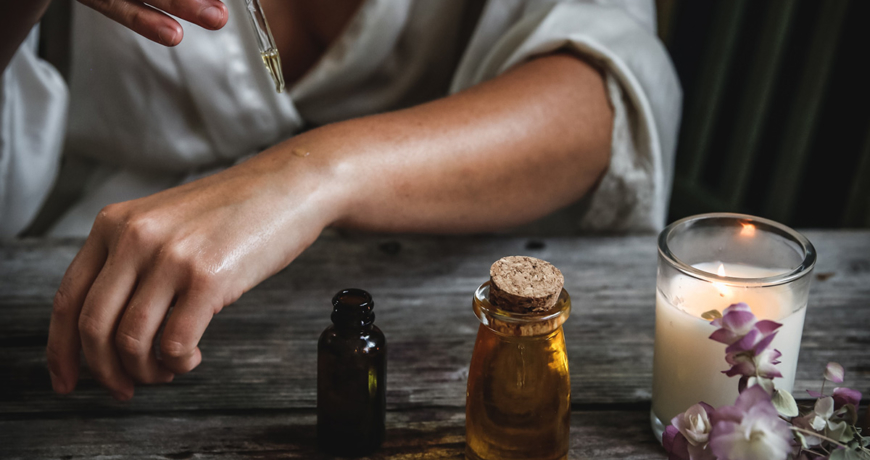Fact or Fiction: On the Topic of Allergies + Sensitization
Fiction: Essential oils are natural, so you can’t be allergic to them.
Also Fiction: The reaction you are having to an essential oil is really your body detoxifying.
Fact: There is no such thing as 100% hypo-allergenic, because of the way the human body reaction to things that is perceives as a foreign invader.
Also Fact: Your body reacting to undiluted essential oils is not detoxification. It is most commonly a chemical burn. Unfortunately people are burning themselves right and left with the belief that the pain, swelling, rash and even blisters are the result of detoxification. It is not. Let me explain.
First, let’s talk about sensitivities and allergies. I’m going to focus on skin reactions for the purpose of this blog post.
Skin allergies are very common, but allergies can impact any area of the body. A skin allergy reaction can appear in the form of a rash, welt or hives. These inflammations of the skin may be in isolated patches or in general areas. In order to have an allergic reaction you simply need to have been exposed at least one time to a substance, at which time your body identifies it as a foreign invader. The next time you are exposed to that substance, your body sends out the troops to protect itself, and suddenly you have an allergic reaction. Your body has an exaggerated immune response. The same substance will cause absolutely no reaction in non-allergic people because the body sees the substance as harmless, because it is if you aren’t allergic to it. Many times, an allergic reaction shows up on the skin whether it was caused by topical exposure or not.
An allergy is the body’s immune system rejection of a substance—that substance can be natural or unnatural. The body does not differentiate between the two. If it was even possibly true that natural products were never the cause of allergic reactions, how do you explain nut allergies? Mold allergies? Hay fever? The list goes on and on of completely 100% natural things that people are mildly or severely allergic to.
An allergic reaction is caused when the immune system sees a substance as a foreign invader. In reaction to the foreign invasion of allergens, the body sends T-cells—a group of white blood cells—out to fight. In skin allergic reactions, this causes redness and irritation. Your risk of developing an allergy isn’t necessarily related to the natural or chemical composition of a substance, but instead it is related to your parents’ allergy history.
I am one-quarter Irish and suffer from both sensitive skin and allergy-prone skin. People with red hair, or who have Celtic, Irish, British, or Scottish heritage often suffer from sensitive skin, which is characterized by very thin, fragile and pink colored skins. Sensitive skin is often mistaken for allergy prone skin. In sensitive skin the blood vessels and nerve endings are closer to the surface of the skin, which causes it to get irritated and redden easily from external or internal irritants. Not only can topical application of a substance cause sensitive skin to redden, but so can eating spicy food, consuming caffeine or alcohol, taking niacin (vitamin B3), exposing the skin to sun, or using tobacco.
Sensitive skin is much more likely to develop reactions and allergies to cosmetics and essential oils. However, many reactions for people with sensitive skin may not be associated with true allergies. I can attest to this phenomenon. In reaction to some cosmetic ingredients or internal stimulus, my skin just gets a little reddened, while my reaction to others is a rash, welts or hives. It takes special attention to the details of foods, environmental and topical exposures and to isolate what is causing simply red, irritated skin versus what is causing a true allergy. Either way, anyone with sensitive skin knows that whether it is a true allergy or simply a reaction from sensitive skin, it is desirable to avoid the cause of the reaction in the future.
Some people believe that since essential oils contain no proteins, they cannot cause allergic reactions. This is best explained by Robert Tisserand in a blog post entitled New Survey Reveals Dangers of Not Diluting Essential Oils on the Tisserand Institute page, “Some essential oil constituents, such as cinnamaldehyde, can cause allergies because they are haptens. This means that they are ‘protein-reactive’; they bind with proteins in the skin. More specifically, they bind with peptides (short chains of amino acids) on the surface of Langerhans cells, and the Langerhans cells then migrate to local lymph glands, where the peptide-allergen complex is presented to T-lymphocytes. Antibodies are then created, and the next time the same hapten contacts the skin, an allergic reaction is almost inevitable.”
Sensitization
Now let’s talk about the very real topic of sensitization. This one breaks my heart because in most cases sensitization is totally avoidable. Most people who use properly diluted essentials oils will not develop sensitization. One of the huge factors in sensitization is dosage. An essential oil diluted at 1% is significantly less of a dose than an undiluted application of 100% essential oil. Some of the other factors that increase your risk of sensitization include your genetic predisposition, rate of absorption, general health, age, and frequency of exposure.
In case you are not familiar with the term sensitization (or believe that aromatherapists are fear-mongers) here are a few definitions:
Miller-Keane Encyclopedia and Dictionary of Medicine, Nursing, and Allied Health: exposure to allergen that results in the development of hypersensitively.
Farlex Partner Medical Dictionary: Immunization, especially with reference to antigens (immunogens) not associated with infections.
Mosby’s Medical Dictionary: Reaction in which specific antibodies develop in response to an antigen. Allergic reactions result from excess sensitization to a foreign protein.
The list goes on and on here at Medical Dictionary.
Mast Cell Activation Syndrome
While researching Ehler’s Danlos Syndrome, I recently came across information about Mast Cell Disorders. It is important for people who use and share essential oils to be aware Mass Cell Disorders.
According to The Mastocytos Society, “Mast cells (MC) are immune system cells that live in the bone marrow and in body tissues, internal and external, such as the gastrointestinal tract, the lining of the airway, and the skin. Everyone has mast cells in their body, and they play many complex and critical roles in keeping us healthy. The positive roles that they play include protecting us from infection, and helping our body by participating in the inflammatory process. However, mast cells are also involved in allergic reactions, from the tiny swelling that appears after a mosquito bite to a life threatening, full-blown anaphylaxis. Mast cells have within them small sacs, or granules, surrounded by membranes. The sacs contain many different kinds of substances called mediators, which participate in all of the roles above, including allergic response and anaphylaxis. The mediators are selectively released when there is an allergic or mast cell based reaction.”
If you read further you will find, “Mast cell disorders are caused by the proliferation and accumulation of genetically altered mast cells and/or the inappropriate release of mast cell mediators, creating symptoms in multiple organ systems.”
On a page about symptoms and triggers I found, “Mast cells can be activated to release mediators by multiple triggers. Please note that any patient with a mast cell disorder can potentially react to any trigger, and triggers can change over the course of the disease. In addition, patients may experience reactions to virtually any medications, including medications that they have tolerated previously.”
This particular website has a medical prospective so the discussion is about medications, but the potential for someone with a Mast Cell Disorder to develop new triggers is very real and can be applied to medicines, foods, essential oils, environmental factors and more.
As you can see the topic allergies, sensitization, sensitivities and beyond is complex. The Detox Theory, unfortunately, is not the answer to why you may be having a reaction. Trust me, I wish that it was a fact and not fiction.






Pingback:Confession from an Aromatherapist - Kayla Fioravanti
Pingback:Fact or Fiction: Drinking Essentials Oils is Perfectly Safe
Pingback:Warnings dōTERRA & Young Living Won't Tell You - Kayla Fioravanti
Pingback:Robyn's Adverse Reaction to Essential Oils - Kayla Fioravanti